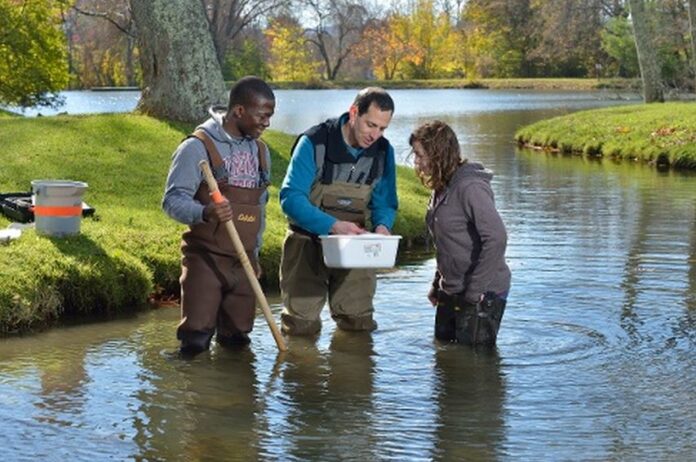
USA Today College has ranked Virginia Tech as the nation’s best for studying natural resources and conservation.
“We are proud of our efforts that contributed to this ranking,” said Paul Winistorfer, dean of Virginia Tech’s College of Natural Resources and Environment. “For many years various professional studies and groups had been rating both our undergraduate and graduate programs at or near the top. It is nice to finally have a major media organization recognize our educational program as the best in the country.”
In the past, media organizations traditionally have not ranked natural resources programs because most rankings focus on disciplines and curricula that enroll larger numbers of students. While many U.S. colleges offer environmental science and natural resources related courses, only 46 institutions offer a comprehensive slate.
USA Today wrote that natural resources and conservation studies programs are important to rank “because conserving natural resources has become a topic of intense interest…. People have realized the importance of preserving the world we live in and maintaining it for future generations.”
In 2013 the U.S. graduated 17,818 students from natural resources and conservation related programs from 729 colleges and universities.
College Factual, which collected the data, noted that it used more objective data and metrics that are outcomes than other rankings that relied on data from subjective surveys. “One of our strengths is that we can rank many more colleges and majors than your typical ranking site,” explained College Factual.
Under Winistorfer’s leadership the college has emphasized the science of sustainability as its core brand to shape its curricula, a focus that contributed to its USA Today ranking. “Our students come to us because of our academic excellence and uniqueness,” he said.
“Our program is at the nexus of climate, energy, air, and water issues that impact production of food and material needs for human society,” Winistorfer pointed out. “We teach and research how to lower the human carbon footprint by producing, utilizing, and conserving renewable resources while sustaining our planet. Healthy ecosystems produce healthy economies. They are all interdependent.”
For instance, housed in the College of Natural Resources and Environment but cutting across four other Virginia Tech colleges and 13 departments, a new bachelor of science degree titled Water: Resources, Policy, and Management addresses complex interdisciplinary issues. The degree provides students with a background not only in water science but also in law, economics, management, and the social sciences.
One of the most innovative offerings in the nation, the water degree reflects Virginia Tech’s umbrella brand of Invent the Future. It will prepare students to take leadership roles in addressing what some policy planners call the most critical global challenge — ensuring that all people have the quantity and quality of water needed for life.
With cellulose nanomaterials a growing field, the traditional wood products curriculum has evolved into a sustainable biomaterials degree, the first so named in North America and with a focus on applying science, technology, engineering, and business to a major sustainable natural resource. A packaging systems and design degree was also developed, recognizing the materials, energy, and economic strength of the global packaging sector.
Highly accomplished wildlife professors engage students in projects ranging from conserving the red knot and piping plover to linking infectious diseases in Africa to wildlife human interfaces. Fishery students are learning how to restore endangered mussels to rivers and streams. New degrees and minors in meteorology, marine fisheries, and geospatial science attract students.
“Our world-recognized forestry program keeps moving into the future as it adopts such majors as environmental resources management and environmental informatics, and minors as sustainable natural resources and environment,” Winistorfer added.
Students study remote sensing and satellite imagery, learning how to apply the amazing tools of geospatial information technology to better manage natural resources, from forests to fish and wildlife.
“Our first-year experience course to help provide freshmen with a strong foundation and skill set in problem solving, inquiry, and integration of learning skills was honored as one of the three exemplary programs on campus,” Winistorfer continued. “Our new advising center reinforces our commitment to student success.
The college’s highly successful Leadership Institute is priming students for leadership roles once they graduate and pursue careers in natural resources. The college’s new Sustainability Institute, available to any student at Virginia Tech, teaches students how they will be able to help their future employers engage in decision-making that factors in sustainability.
“Our faculty and staff are passionate about their work and personalize our college so students are mentored well,” Winistorfer said. “We continually move forward to stay relevant so that we truly advance the science of sustainability. We build on a great heritage left by our college’s visionary founder, Professor Emeritus John Hosner. And we constantly position ourselves to make a difference in the world. This ranking is continuing confirmation of the quality and impact of our program.”

